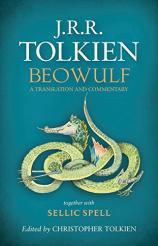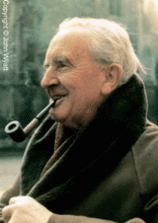Beowulf: A Translation and Commentary
Review
Beowulf: A Translation and Commentary
Current popular fantasist Terry Pratchett once said that "Most modern fantasy just rearranges the furniture in Tolkien's attic." These days, there are more and more arguments, for and against, about the idea of J.R.R. Tolkien as the Father of Fantasy. One thing that cannot be denied is that Tolkien left an indelible stamp on the still underrepresented and developed genre of fantasy, inspiring a great many authors to pick up their pens because of the work he provided, often using THE HOBBIT or THE LORD OF THE RINGS as blueprints.
Just as authors have looked back through the years to Tolkien, so too did the linguist and professor himself look back to those who came before him for inspiration. From the Kalevala to the Völsunga saga and the Nibelungenlied, from the Elder Edda to William Shakespeare's Macbeth and the varied mythologies of Europe, Tolkien drew from their pools to craft his legend.
And in that attic, secluded in a corner but protected and watched over with great care, is a chest of treasure. Creaking open those hinges and looking inside, those who take a peek will find the great legend of Beowulf, an Old English epic poem often cited as one of the most important works of Anglo-Saxon literature.
"BEOWULF takes up a mere 100 pages of this book. Filling out the rest of the bulk of the work, Tolkien's son, Christopher, has included some of his father's scholarship and commentary on the poem. This is extraordinary work, particularly if you have any interest at all in Beowulf and a study of all that can be found and debated about in this legendary poem."
Tolkien translated BEOWULF and set it aside in 1926. He was only 34 years old, and he found the work to be mostly unacceptable. Over the years, as his scholarship of the poem and his thoughts on the content of the work evolved, he would make his way back to his chest and revise the volume. He also engaged in more scholarly pursuits with regards to BEOWULF, with his 1936 lecture Beowulf: The Monsters and the Critics becoming a cornerstone of BEOWULF scholarship. It was in this lecture that Tolkien argued for the understanding of the poem as poetry, as a work of art, and not as a historical document.
Tolkien's own translation is a wonder. As a master of language, he worked to diligently undertake as literal a translation as possible, and he opted for a prose presentation rather than verse. Given over to his style, Tolkien's BEOWULF has beautifully rendered passages, but in some places, his insistence on accurate translation results in awkward phrasing. It can hardly be doubted that it was some of this leaden text that he was displeased with and thus why he had never intended for his BEOWULF to see the light of day in publication. On the whole, however, the beauty far surpasses the bleak. His take on the legend of the Geat warrior is sublime, and, more than a mere poetic retelling, it is an elegy.
BEOWULF takes up a mere 100 pages of this book. Filling out the rest of the bulk of the work, Tolkien's son, Christopher, has included some of his father's scholarship and commentary on the poem. This is extraordinary work, particularly if you have any interest at all in Beowulf and a study of all that can be found and debated about in this legendary poem. Note, however, that if you cringe at the notion of a scholarly insight, rest assured that Tolkien's walk through the ins and outs of BEOWULF could, in some ways, surpass the translation itself. The author's intimacy with the source material is extremely evident, and his love and understanding of the poem come alive on the pages. It is truly glorious to read.
More gems still remain, including The Lay of Beowulf, which are two ballads Tolkien wrote and used to sing to Christopher when he was a lad. And also included is Sellic Spell. Originally penned by Tolkien around 1940, it was his attempt to devise an origin story for the great dragon and of Grendel and his mother --- his imagined tale of what may have once been the story before BEOWULF. It is a charming and interesting fairy tale.
J.R.R. Tolkien seems never to have intended for BEOWULF, as he translated it, to see the light of day. Christopher made the decision to publish this work, as well as the accompanying commentaries and side pieces, not as a means by which people could compare his father's translation to that of others (everyone has been keen to compare Tolkien to the award-winning Seamus Heaney). Rather, he wanted the world to see the work that his father so loved, and he desired to present it as a memoriam to the author in his time --- a snapshot of a young professor and writer whose passion for BEOWULF compelled him to work, and that fed and inspired some of the greatest fantasy the world has ever known.
Reviewed by Stephen Hubbard on June 20, 2014
Beowulf: A Translation and Commentary
- Publication Date: August 4, 2015
- Genres: Fantasy, Fiction, Literary Criticism
- Paperback: 448 pages
- Publisher: Mariner Books
- ISBN-10: 0544570308
- ISBN-13: 9780544570306





